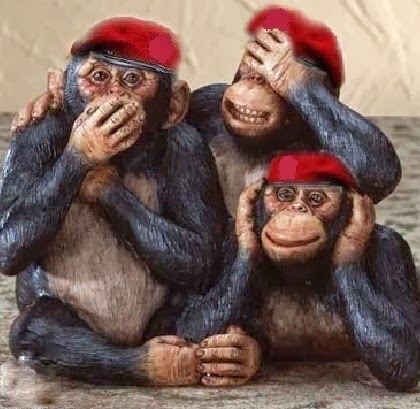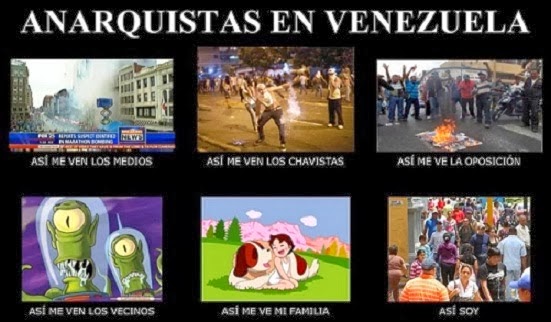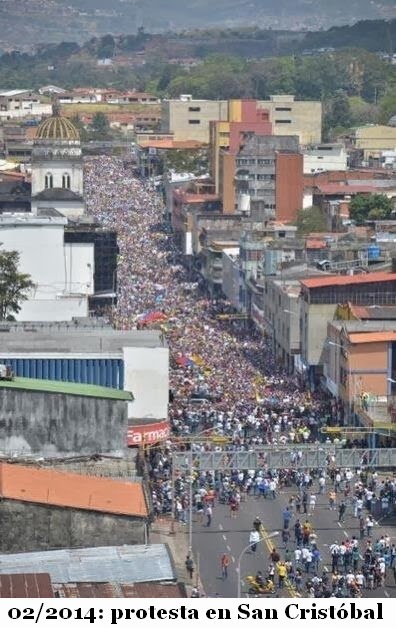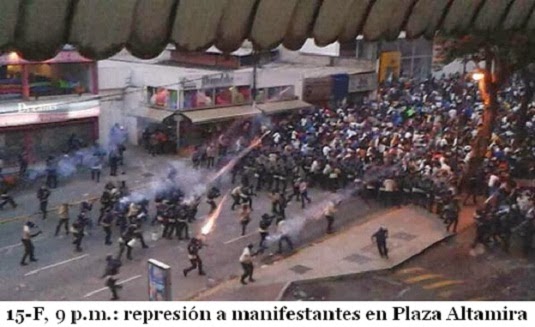Translation of “From Chile, a pitch for the foundation of anarcho-Madurism” (Armando Vergueiro, from El Libertario)
Here is another translation from Venezuela. This was a controversial one. As I mentioned previously, many writers on the left looking in on the Venezuelan situation from outside of the country operate from a limited selection of official
news sources, heavily influenced by either the ruling Socialist party or one of the right-wing opposition parties; many independent radicals in Venezuela are finding this extremely frustrating and have been trying to put out their own view of things. This here is a broadside assault by the Venezuelan anarchist Armando Vergueiro against a document from some Chilean Platformists expressing uncritical support for the Boli-Socialist government. The comments thread had drawn 75 comments, last I checked, including angry retorts from FEL and also some stinging criticisms of FEL from other anarchists in Chile.) It was posted online by the anarchist newspaper EL LIBERT@RIO. Inline links and editorial notes in footnotes are added by me. As always, the same caveats apply: I’m a nervous translator trying to keep up with a lot of regional references that I don’t always know, and moving through a lot of material coming out more quickly than I can translate it; this is a working draft; if you notice any mistakes or mangling please feel free to point them out in the comments, and I'll attach a note or a correction to the text here.
From Chile, a pitch for the foundation of anarcho-Madurism
Armando Vergueiro
In the web page maintained by the Chilean Platformists in the Federation of “Libertarian” Students (FEL), there has been published, in a stellar plan, an official declaration from this grouping, which without a doubt will pass into history as the cornerstone of a new and picturesque version (or better misrepresentation) of non-hierarchical thought[1] It goes by the name
With the Venezuelan people and against the coup movement,and it deserves that we should occupy ourselves, even if briefly, with the pearls that adorn it.
Out of the ignorance that only nurtures itself and gives credibility to what it sees on TeleSur about Venezuela, in the first paragraph it talks about
a march of university students, from the most privileged sectors in Venezuelan society.Nobody told thesecomradesthat today the most privileged sectors in these streets are the Boli-bureaucracy, the politico-military elite in power, their transnational associates like Chevron and Gustavo Cisneros, the Chinese “comrades” and the parasites of the old Cuban bureaucracy?According to FEL, in Venezuela there is “A process of radical transformations that has bettered the life of the majority of the inhabitants of that country, above all for the ordinary people and workers.” Don’t expect another opinion from those who just read here the stuff they’re given in the waiting room at the Madurista government’s embassy in Santiago, so that it would be a waste of time to suggest they look for the multitude provable and verifiable sources that refute that propagandistic idea, not to mention consulting the dominant opinion among Venezuelans in the streets.
Today the Venezuelan right is trying to disable the legitimate government of Maduro in order to create an environment suitable for carrying on their plans for a coup d’etat.Apart from the touching sight of these “libertarians” preoccupied with the fortunes of a legitimate government, this is olympically detached from the fact that after 15 years, and especially after the coup attempt in 2002, the Armed Forces have been, one the one hand, submitted to a politico-ideological purge that has exterminated whatever dissidence from their heart. And on the other, being even more important, they have accentuated the militarization of the apparatus of the State, arriving at a degree where it is made incomprehensible that they should want a coup in order to displace themselves from a government that favores them with ample powers and possibilities for enrichment through corruption. If there were any such military coup or anything similar, it would be in order to guarantee their privileges and immunities even more.The — FEL-istas? FEL-ines? FEL-ons? — proclaim:
this attempt that today is made from the mobilization in the streets, the call to violence, the manipulation of information and the hoarding of goods to create the sensation that there’s a crisis that the government is incapable of resolving. Since they couldn’t win at the ballot-box, they are trying to pull down the government and put an end to the revolutionary project of the people, hoarding basic necessities, calling for violence and generating the environment to legitimize a coup d’etat.Once again they evince an unfamiliarity with the present juncture in Venezuela, except for what the government asserts, which is only explicable only by fanatical ignorance, out of taxed cynicism or lost innocence. Furthermore, we hold back the opinion that, as anarchists, we believe is deserved by FEL’s dismay that there are doubts about the government’s capacity to resolve the crisis. You can take our silence the same way concerning the sanctimonious indigation, with the stalest electoral flavor, against those whocouldn’t win at the ballot box…They complain with sadness because in Chile:
the future president elect and the greater part of the forces of the New Majority keep a complicit silence, or simply lament the acts of violence in an abstract way. They do not denounce those who try to hold back a political and social project of justice and equality for all, because they do not share it.At least it should be said that this lament is a truism, for how could you expect anything else from Do?@c3;b1;a Bachelet[2] and her gang?In the best spirit of the Stalinist Popular Front in the 1930s, they preach:
We believe to be necessary the greatest unity of the Chilean and Latin American left to sharply denounce and reject the coup movement’s attempts in Venezuela. Once more as libertarians we are opposed to this type of play from the right, allied with imperialism, to hold back the socialist project of the people of Venezuela.No other diligent student of Martha Harnecker and other classics of continental Marxist-Leninism could have said it better!Continuing their tale worthy of obedient PaCos militants (or the communist party, same thing),[3] now one has to give:
All our support and solidarity to the working people of Venezuela, the principal actor in the construction of socialism in their country and in which we are fully confident.This vote of absolute faith would be because whatever opposition to the sacrosanct government of Maduro, even what might come from anarchism and critical segments of the left,seeks to end the process of change that they have carried forward there for more than 15 years.No doubt, withcomradeslike those at FEL, anarchism doesn’t need any enemies!As a glorious finish, these
fellow travelersconclude with a celebration that they will surely applaud in the Venezuelan embassy, so that we wouldn’t hesitate to put it forward as worthy of airfare for revolutionary tourism to the beaches of the Caribbean Sea:Yet much is lacking, there exist contradictions and issues for debate like in any process, but the socialist project continues intact. To the deepening of the Bolivarian process, to the building of socialism.Clearly the editors of the seeming gem will not be pleased with qualifying as anarcho-Maduristas. They prefer to call themselves
libertarians,— orlibertarian communistsin their moments of radical emotion — when they are in Chile and the rest of Latin America; although curiosly they do identify themselves as anarchists when they come to promote themselves in North America or in Europe. All the same, it’s worth leaving them the nickname, because it fits them very well.— Desde Chile se lanza documento para fundar el “anarco-madurismo,” (18.Feb.2014). Translated by Charles W. Johnson.



